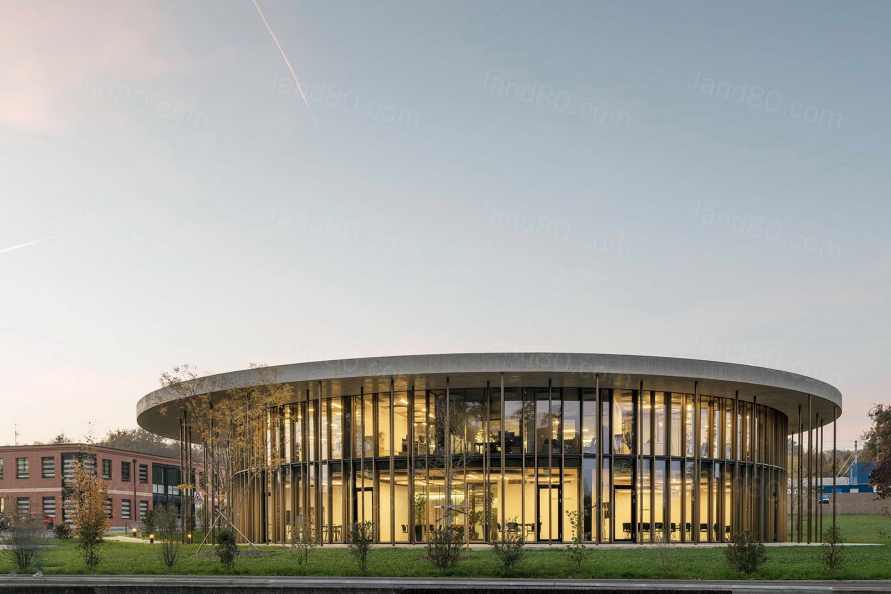项目简介
这个优雅和标志性的国际摩托车联合会的新总部在日内瓦郊区公路和铁路交汇处的一个场地上等待了十年才得以建成。2006年,LOCALARCHITECTURE和Bureau d'Architecture Danilo Mondada赢得了国际摩托车联合会位于沃州米斯的总部扩建项目的竞赛,在国际摩托车联合会的行政部门发生变化后,该项目被放弃了。但项目于2013年得以重新启动,由LOCALARCHITECTURE事务所单独操刀重新设计。
Introduction
Elegant and iconic, the new headquarters of the FIM (International Motorcycling Federation) had to wait ten years before taking shape on a site in the outskirts of Geneva where road and railway meet. It was in 2006 that LOCALARCHITECTURE and Bureau d’Architecture Danilo Mondada won the competition (conducted by the MEP – Mandat d’Études Parallèles – parallel development selection process) for the extension of the International Motorcycling Federation’s main headquarters in Mies in the canton of Vaud. Following a change of administration at the FIM the project was abandoned. A new selection procedure with invited architects was launched in 2013, with a modified functional programme. At this point the mandate was awarded to LOCALARCHITECTURE.

公园里的亭子
在连接日内瓦和沃州的铁路和州级公路之间,在一片绿树成荫的坡地上,项目给人有一种公园里的亭子的感觉。该建筑占据了自然景观地块的下部,从相邻的环岛看去,是一个气势恢宏的圆形存在。
A pavilion in a park
Set between the railway and the cantonal road connecting Geneva to the canton of Vaud, on a sloping terrain with trees, the new international headquarters of the motorcycling world has the air of a pavilion in a park. The building occupies the lower part of the naturally landscaped plot, an imposing circular presence when seen from the adjacent roundabout.

加速、速度和运动学
该建筑放置在一个高于地面的底座上,并由一个宽大的平屋顶保护,由精美的柱子支撑,在一个多样化的建筑环境中作为焦点而引人注目。它的环形形式唤起了摩托车世界的运动和速度感,由柱子森林连接的偏置的椭圆形板的动态安排暗示了这一点。柱子的垂直节奏和立面的深度,在州际公路上的过往司机或铁路上的乘客看来,产生了动感的效果。该建筑由毗邻场地的一条小路进入。主入口直接与通道相连,而位于建筑北侧的次要入口则与员工停车场相连。
Acceleration, speed and kinetics
Set on a base which raises it above ground level and protected by a wide flat roof supported by fine columns, the building stands out as the focal point in a diverse architectural context. Its circular forms evoke the movement and speed of the motorcycling world, suggested by the dynamic arrangement of the offset oval slabs connected by a forest of pillars. The vertical rhythm of the pillars and the depth of the façade produce a kinetic effect when viewed by passing drivers on the cantonal road or passengers on the railway. The building is accessed by a path adjacent to the site. The main entrance connects directly to the access road while a secondary entrance on the north side of the building connects to the staff car park.




采光和透明度
建筑包括地下室上共有两层,由两个入口进入。它们界定了平面图的规则网格,将用户引向一个中央大厅,提供通往各种功能的通道。底层是主要的公共空间:东侧是礼堂和培训室,南侧是食堂和展览空间。这些空间被设计成灵活和模块化的。在建筑的中心,天窗圆顶的自然采光,是一个连接两层的纪念性楼梯。它的螺旋形式延伸了入口大厅的向上运动,通向上层的行政和管理设施。作为一个整体的混凝土浇筑,它的三角形底面暗示了一种脊椎结构,就像一根脊柱,承载着整个建筑的透明框架。
Light and transparency
The new FIM building replaces the former headquarters, which was demolished. It comprises two storeys over the existing basement level and is accessed by two entrances, perpendicular to the façade, on the ground floor. They define the regular grid of the floorplan, leading users to a central hall which provides access to the various functions. The ground floor houses the major communal spaces: the auditorium and the training room on the east side, the cafeteria and exhibition space to the south. The spaces are designed to be flexible and modular. At the heart of the building, with natural lighting from the skylight domes, is a monumental staircase that connects the two levels. Its spiral form extends the upward movement of the entrance hall, leading towards the administration and management facilities on the upper storey. Cast in concrete as a single unit, its triangular underside suggests a vertebrate structure – like a spinal column bearing the transparent framework of the building as a whole.

用户舒适度
建筑物的安装技术是为了保证用户的最大灵活性而开发的。该建筑的技术设施的开发是为了确保用户的最大灵活性。在外围的办公区域,热能活性板系统从天花板上提供加热和冷却,而通风系统和电力网络则安装在高架地板下面。大厅和流通区域没有任何技术装置,只有地面上的地板是加热的。建筑声学是通过办公室天花板上的圆形挡板来管理的。季节性的太阳能过热在地面上通过外部百叶窗系统进行管理,在上层则通过超大的屋顶板进行管理,其轮廓设计与太阳在天空中的轨迹相一致。
User comfort
L’installation technique du bâtiment a été développée dans le but de garantir un maximum de flexibilité aux usagers. The building’s technical facilities were developed to ensure maximum flexibility for its users. In the peripheral office areas, the thermally active slab system provides heating and cooling from the ceiling, while the ventilation system and electricity network are fitted below the raised floor. The hall and circulation areas are free of all technical installations except for the floor at ground level, which is heated. Building acoustics are managed via circular baffles arranged on the office ceilings. Seasonal overheating from solar energy is managed at ground level by a system of external blinds and on the upper storey by the oversized roof slab, its contour designed to match the sun’s pathway across the sky.

Project: Project: International Motorcycling Federation
Architects: LOCALARCHITECTURE, Lausanne, CH
Construction management: Thinka Architecture studio, Onex
Civil engineering: INGENI, Ingénierie structurale, Carouge
Heating/Ventilation/Plumbing/Electricity engineers: Amstein Walthert, Genève
Acoustical engineering: Architecture & Acoustique SA, Genève
Lighting: Etienne Gillabert, Paris
Façade design: BCS SA, Neuchâtel
Photographer: Mathieu Gafsou, Joel Tettamanti
|